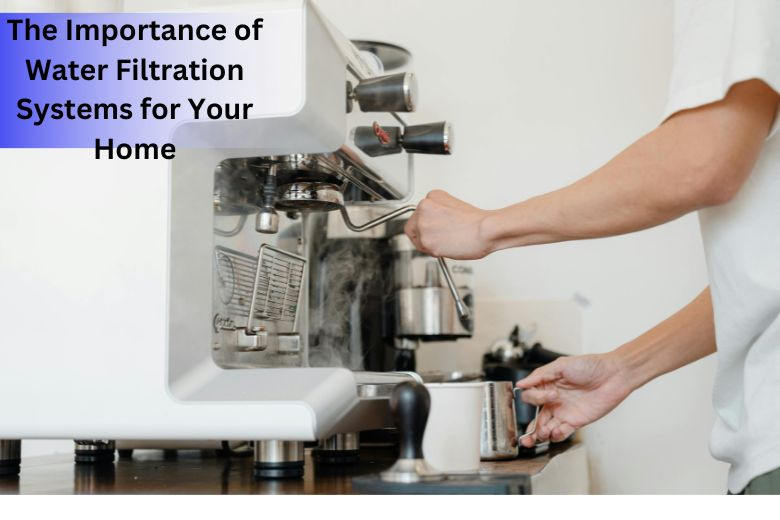The Importance of Water Filtration Systems for Your Home
Posted on August 02, 2024 by Admin

Water filtration systems are becoming increasingly essential for maintaining the health and safety of your home’s water supply. With concerns about water quality on the rise, understanding the importance of these systems can help you make informed decisions about protecting your family’s health and improving the overall quality of your water.
Must Read : How to Handle Plumbing Emergencies: A Homeowner's Guide
Up-gradation of Water Quality
Removal of Contaminants: Most of the contaminants in tap water get filtered by the water filtration system. These include bacteria, viruses, chlorine, heavy metals, and sediments. With all these filtered out, the water for drinking purposes, cooking, and bathing shall be pure and free from dangerous substances.
Improved Taste and Odor
Filtered water tastes better and is always fresher than unfiltered tap water. This is very important if the tap water is unsatisfactory in both its taste and odor. Drinking a glass of water should give satisfaction and increase a person's urge to drink plenty of it to keep the body well-hydrated.
Personal Health
Reduces Health Risks:
These include lead, chlorine, pesticides, and quite a number of others that may be very dangerous in the long run through conditions like digestive system diseases, respiratory diseases, and side effects. An effective water filtration system should minimize the risks by ensuring that most of these harmful materials are removed from the water before they reach your tap.
Supporting Health:
Overall, it's evident that clean water is good for the skin, better digestion, and more—the count of many waterborne diseases will decrease. Filtration systems see that your family members have and consume not only safe water but more healthful water.
Must Read : Top 5 Signs Your Roof Needs Repair or Replacement
Pocket-Friendly Solution
Minimize Bottled Water Consumption:
If you invest in a water filtration system, then you are going to reduce your addiction to bottled water. This is an economic gain in the long term and may also help the environment by lesser plastic bottle wastes.
Less Maintenance Cost:
Filtered water can extend the life expectancy of your in-house plumbing and appliances. Scale and sediment in water require much work and cost in keeping repair and general maintenance, which is going to be cut down.
Types of Water Filtration Systems
Activated Carbon Filters :
Effective at removing chlorine, sediment, and several volatile organic compounds. They are applicable in pitcher filters and under-sink systems.
Reverse Osmosis Systems :
These work with a semi-permeable membrane, meaning that they are capable of removing most pollutants, including heavy metals and salts. They are suitable for those ready to deal with a maximum filtration capability.
UV Purifiers :
It is a process that kills bacteria and viruses in water by ultraviolet light. This therefore can be a very good way of making sure that there would be no microbiological hazard.
Faqs
-
1. How to select the appropriate domestic water filtration system?
The right water filtration system for your household depends on your needs at home and the nature of your water supply. First, test the water for contaminants. If it's purely an issue of taste and odor, then an activated carbon filter will suffice. Otherwise, more filtration could be had in reverse osmosis. You can also have a representative from the water treatment company come in and consult on a particular solution depending on your quality of water and your needs.
-
2. How often should I change my filters in the water filtration system?
Replacement time will vary depending on the filter type and how much water passes through it. As a rough guide, an activated carbon filter should be replaced every 6–12 months, and a reverse osmosis membrane every 2–3 years. Abide by the manufacturer's recommendations of when to replace filters so that your system keeps on performing at its best, and your water tasting great.
-
3. Will a water filtration system rid my water of all contaminants?
While water filtration systems are good at removing many contaminants, there isn't one that removes every conceivable contaminant. You have to go for a system that resolves those issues found in your water test. You would need to deliberate further on the manifold ways of filtration for full coverage of treatment. Of course, this involves periodic servicing and changing the filters for guaranteed efficiency.
Recent Post
- Top Plumbing Service Providers in Arizona, USA
- Top 10 Electrician Service Providers in Alabama, USA
- Top 20 Roof Repair Service Providers in Alabama, USA
- The Role of Roof Insulation in Energy Efficiency: Tips and Tricks
- Understanding Roof Damage from Wildlife and How to Prevent It
- How to Choose the Best Roofing Contractor for Emergency Repairs
- Roofing Maintenance for Historic Homes: Preserving Architectural Integrity
- The Importance of Proper Attic Ventilation for Roof Health
- How to Identify and Prevent Roof Mold and Mildew
- The Best Practices for Removing Snow from Your Roof